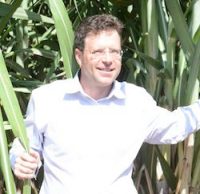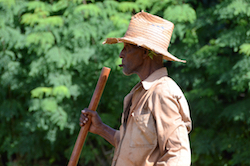 Few Americans can say they have stepped foot on Cuban soil. Even fewer can say they had the opportunity as a journalist and yet even fewer as an agricultural journalist. Luckily, I am one of those who can answer yes to all of the above. Thanks to the American Agricultural Editors’ Association (AAEA) and Alltech, I recently traveled to Cuba to learn about Cuban agriculture, tourism and the future role U.S. can play in each if the long-standing embargo is lifted.
Few Americans can say they have stepped foot on Cuban soil. Even fewer can say they had the opportunity as a journalist and yet even fewer as an agricultural journalist. Luckily, I am one of those who can answer yes to all of the above. Thanks to the American Agricultural Editors’ Association (AAEA) and Alltech, I recently traveled to Cuba to learn about Cuban agriculture, tourism and the future role U.S. can play in each if the long-standing embargo is lifted.
 Chicago Foods International president Paul Johnson organized and led our delegation on the week-long expedition to the nearly foreign world only 40 miles off the coast of Florida. Paul is no stranger to Cuba, making his first journey south in 1995. He helped found the U.S. Ag Coalition for Cuba which represents about 120 national groups each working collectively on individual interests with the common goal of improving trade relations with Cuba.
Chicago Foods International president Paul Johnson organized and led our delegation on the week-long expedition to the nearly foreign world only 40 miles off the coast of Florida. Paul is no stranger to Cuba, making his first journey south in 1995. He helped found the U.S. Ag Coalition for Cuba which represents about 120 national groups each working collectively on individual interests with the common goal of improving trade relations with Cuba.
 ‘Normalizing relations’ was a coined term used throughout our stay in Cuba. The U.S. Ag Coalition for Cuba is working on a trade bill which would do just that. The extension of U.S. credit to Cuba is the key factor to future trade deals. This will allow exporters to compete with other countries and support two-way trade giving Cuba even more opportunities. However, tourism is also a crucial part of this normalization. Opening the border and allowing U.S. citizens to travel as tourist will allow Cuba to profit and then use to purchase agricultural products. The growth of tourism is a win-win for the U.S. because they will be wanting a safe, quality products.
‘Normalizing relations’ was a coined term used throughout our stay in Cuba. The U.S. Ag Coalition for Cuba is working on a trade bill which would do just that. The extension of U.S. credit to Cuba is the key factor to future trade deals. This will allow exporters to compete with other countries and support two-way trade giving Cuba even more opportunities. However, tourism is also a crucial part of this normalization. Opening the border and allowing U.S. citizens to travel as tourist will allow Cuba to profit and then use to purchase agricultural products. The growth of tourism is a win-win for the U.S. because they will be wanting a safe, quality products.
In this week’s ZimmCast listen as Jamie Johansen talks with Paul who gives us a glimpse into the Cuban Gold Rush. ZimmCast with Paul Johnson, Chicago Foods International

